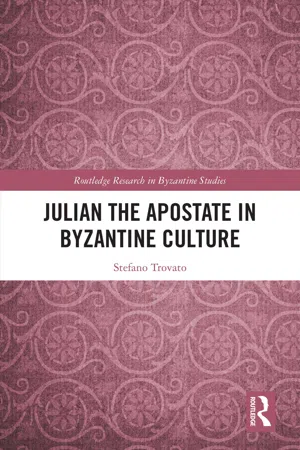
Julian the Apostate in Byzantine Culture
Stefano Trovato
- 384 pages
- English
- ePUB (mobile friendly)
- Available on iOS & Android
Julian the Apostate in Byzantine Culture
Stefano Trovato
About This Book
Julian, the last pagan emperor of the Roman empire, died in war in 363. In the Byzantine (that is, the Eastern Roman) empire, the figure of Julian aroused conflicting reactions: antipathy towards his apostasy but also admiration for his accomplishments, particularly as an author writing in Greek. Julian died young, and his attempt to reinstate paganism was a failure, but, paradoxically, his brief and unsuccessful policy resonated for centuries.
This book analyses Julian from the perspectives of Byzantine Culture. The history of his posthumous fortune reveals differences in cultural perspectives and it is most intriguing with regard to the Eastern Roman empire which survived for almost a millennium after the fall of the Western empire. Byzantine culture viewed Julian in multiple ways, first as the legitimate emperor of the enduring Roman empire; second as the author of works written in Greek and handed down for generations in the language that scholars, the Church, and the state administration all continued to use; and third as an open enemy of Christianity.
Julian the Apostate in Byzantine Culture will appeal to researchers and students alike in Byzantine perspectives on Julian, Greco-Roman Paganism, and the Later Roman Empire, as well as those interested in Byzantine Historiography.